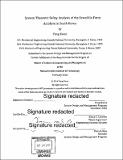System theoretic safety analysis of the Sewol-Ho ferry accident in South Korea
Author(s)
Kwon, Yisug
DownloadFull printable version (22.05Mb)
Other Contributors
Massachusetts Institute of Technology. Engineering Systems Division.
Advisor
Nancy G. Leveson.
Terms of use
Metadata
Show full item recordAbstract
The disaster of the Sewol-Ho, which took place on April 16, 2014, was one of the worst maritime disasters in South Korea in decades, and rescuing only 172 of a total 476 people triggered thorough accident investigations. As the results of the investigations performed by the Korea Maritime Safety Tribunal and the Board of Audit and Inspection of Korea, 399 people were blamed for the accident and arrested, 154 of them were put in jail, many safety policies and manuals were found inadequate, new safeguards against the kinds of accidents were implemented, and Korean high and low governments' structures which were related to the accident were reorganized: disbanding the 61-year-old Republic of Korea Coast Guard and establishing a new Ministry responsible for Korean public safety. The accident investigation reports, however, were limited in revealing the most important systemic causal mechanisms leading to a more complete understanding of the reason why the accident occurred, and therefore, appear to be inadequate in designing and obtaining sociotechnical system level safety because they did not apply system engineering tools in the investigations. The Systems-Theoretic Accident Model and Processes (STAMP), created by Dr. Nancy Leveson, is an accident model based on systems theory. It has been applied to improve system safety in a number of complex sociotechnical systems. STAMP has the capability to help identify a broader set of systemic causal factors and develop and improve the safety control structure for the entire maritime transportation safety structure. This thesis applies the Causal Analysis based on Systems Theory (CAST) accident analysis tool created by Dr. Leveson to the accident and provides the application and findings of CAST. The CAST analysis demonstrated that a complete set of systemic causal factors was identified by the systems theory approach, which was much broader than those of the Korea Maritime Safety Tribunal and the Board of Audit and Inspection of Korea. The powerful and effective tool to reveal the systemic causal mechanism led to the identification of the systemic causal factors and system improvements of the safety control system.
Description
Thesis: S.M. in Engineering and Management, Massachusetts Institute of Technology, School of Engineering, System Design and Management Program, Engineering and Management Program, 2016. Cataloged from PDF version of thesis. Includes bibliographical references (page 174).
Date issued
2016Department
Massachusetts Institute of Technology. Engineering and Management Program; System Design and Management Program.Publisher
Massachusetts Institute of Technology
Keywords
Engineering and Management Program., System Design and Management Program., Engineering Systems Division.